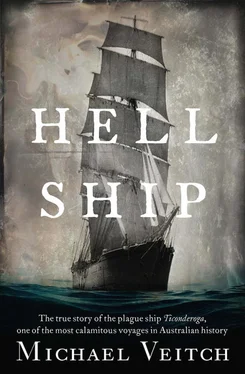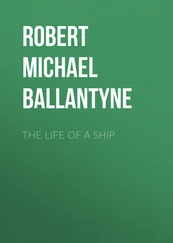But the rush had a terrible downside. The indigenous people of the Kulin nation, the alliance of tribes which had lived and hunted in central Victoria for millenia, already under siege, were catastrophically displaced. Entire forests and tracts of scrub vanished seemingly overnight. Like the frenzy in California, the consequences of such a sudden and uncontrolled injection of wealth into the economy were dangerous and unpredictable. Newly cashed-up miners went on spending sprees, warping the prices of basic items, which soon skyrocketed. Ironically, Melbourne itself became a ghost town, seemingly inhabited by no one but the very old or very young, as men followed their lust for quick wealth to the goldfields. Eighty per cent of the local police force quit, leaving the city to thugs, criminals and packs of marauding dogs. Ships lay idle in the port of Melbourne, unable to sail for lack of crew who had jumped ship as soon as the anchor was dropped. Reports of sea captains vainly trying to restrain their absconding sailors at gunpoint became legion.
It was even worse on the land. Shearers and farmhands, although traditionally well paid, simply walked off their stations to join the ant-like masses scratching over the clays of central Victoria with their new, over-priced picks and shovels.
Meanwhile, the wool still needed to be gathered, and the contracts had to be honoured. News of the rush began to filter back to England and a looming dread settled on the wealthy brows of mill owners. The notion that the annual avalanche of Australian wool could be interrupted, let alone stopped, and the wheels of British industry silenced for no more pedestrian a reason than a paucity of labour was unthinkable.
Anxious letters from Australia were received, then passed on—amplified with urgency—to the government in Westminster. The wool growers of Australia estimated themselves to be facing a 10,000-worker shortfall, and this number was growing. At this rate, the clip for 1852, which was due to be shorn and processed in the Australian spring and promised to be another big one, would remain on the sheep’s back, and the spinning textile mills of England’s industrial north would grind to a halt.
From both England and Australia, fingers were pointed in the direction of the Board, which was seen to simply not be doing its job. What was the good of money from the sale of colonial land being handed over, it was argued, if the Board could not even provide sufficient numbers of people to stave off economic catastrophe? It was decided that the Board’s criteria for accepting emigrants would be overhauled significantly, particularly with regard to children.
Prior to 1851, families with more than three children under ten years of age and two children under seven were excluded from the Board’s scheme. [3] Kruithof, 2002, p. 7
Such a burden of offspring, it was argued, would inhibit their parents’ capacity for productive work once they arrived in the colonies. The other factor was the vulnerability of small children to contract and spread disease in the confined incubator of a sailing ship. Small families, and single young men and women—particularly rural and agricultural workers—were the ideal emigrants, and it was to luring these that the Board had directed its attentions.
But in Victoria it was precisely such unencumbered young men who were now deserting towns and cities in droves and heading for the goldfields. The policy would now be turned on its head. Sheep growers and farmers argued that the anchor of a family was in fact the main factor—indeed the only factor—preventing men from deserting, so the Board up-ended its rules to allow families to travel with up to four children under twelve years of age.
Overnight, families who had previously failed to qualify for the golden ticket of assisted passage found themselves accepted, and the exodus was on. So hungry were some Victorian pastoralists for labour that many emigrants had been snapped up for employment even before they embarked. One of the McRae families, for example (there were several on board the Ticonderoga )—Thomas, 46, Margaret, 36, and their five children ranging from four to fourteen—had travelled from their remote village of Kintail deep in the Highlands to Glasgow. From here they caught the ferry to Liverpool and then Birkenhead, where they met hundreds of other families likewise making the journey, such as Alexander and Nora Cameron and their two young children from the Isle of Bute near Glasgow. Whatever trepidations these men may have had about their future, unemployment was not one of them, as the Board had already indentured both families to landowners prepared to pay well for experienced farm labourers. Thomas McRae was to work on a property at Buninyong near Ballarat, while Alexander Cameron, a forester by trade, would live and work at Werribee near Melbourne.
To have such numbers of young families travelling was a new innovation, and emigration vessels that previously had experienced children and infants only in limited numbers would now appear to be overrun by them.
* * * *
This, however, was the last thing on the minds of the superintendents of the embarkation depot, William and Ann Smith, on this sunny August morning, as they prepared to greet this ferry-load of new arrivals—all Scots—stepping onto the little jetty, full of hope and anticipation. For the moment, their primary concern was to make a good impression on the imposing gentleman standing beside them dressed impeccably in a naval officer’s uniform, eyes fixed on the approaching ferry. No less a figure than Captain Charles George Edward Patey RN, an officer with an exemplary record, a veteran of the Mediterranean who had been made commander by age 27, captain by 33, and who would eventually retire a rear-admiral, had been the Board’s choice to be its representative here at the new Birkenhead depot. His brief was simple: to organise the passengers along naval lines, and to make sure the Board’s directives were being carried out to the letter. William and Ann Smith knew that every aspect of their performance would be observed closely.
For the next few days, until they boarded the ship that would take them to a new life across the seas, these people would be in the Smiths’ care. They would be welcomed, fed, organised into groups or ‘desks’, briefed on the routines of ship life, quizzed and scrutinised by Captain Patey and his small staff to be of sound character, medically inspected and given at least some idea of what to expect on the long journey ahead. It would inevitably be a challenging and confusing time, but the Smiths were determined to do their utmost to make it as easy and as pleasant for the passengers as possible, as well as to give Captain Patey no reason to submit an unfavourable report to London. Just a few hundred yards away, tied up on a separate wharf just out of sight behind the main building of the depot, the great ship herself sat waiting.
‘Hello, hello, welcome,’ the Smiths cheerily assured the passengers making their way cautiously down the gangway of the ferry, children—and there were many of them—in tow. They gathered by the growing pile of trunks and luggage boxes being assembled on the jetty. Mrs Smith noticed the women first, in their finest bonnets and shawls but shy and skittish, still uncertain of this unfamiliar world. They nodded demurely towards the Smiths with dark, wary eyes, offering fleeting smiles. The men too were dressed in their finest clothes, although these were often patched and threadbare. They glanced, blank-faced, at their new surroundings, watching constantly over their wives and families. The children, noted the Smiths, were strangely silent. And every one of them was thin.
Then, slowly, a sound—a murmur—started to rise from the group of several dozen as they gathered their bearings and sorted their luggage, a soft, muted sing-song unlike anything Mr and Mrs Smith had ever heard, even in the melting pot of Liverpool. The matron gasped, alarmed yet intrigued by this strange, ancient sound. It was ‘the Gaelic’, the tongue of those proud, but now blighted inhabitants of the wild and faraway Highlands of Scotland. ‘Welcome, you’re all very welcome,’ offered the Smiths more tentatively. But by the mute smiles they received, it soon became clear that large numbers of these people spoke not so much as a word of English.
Читать дальше












